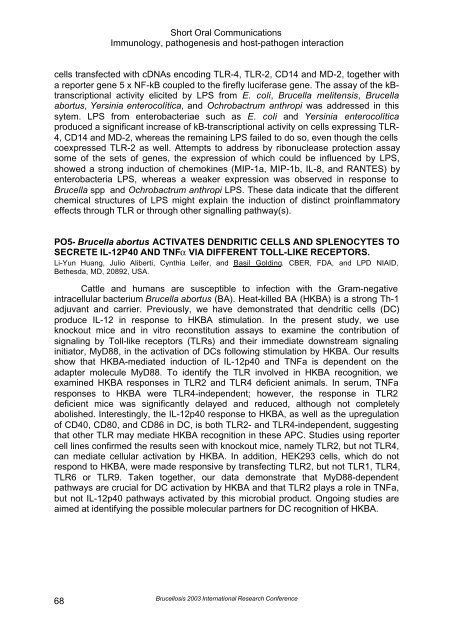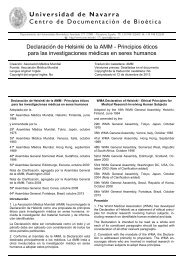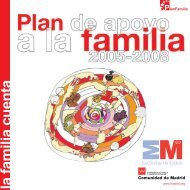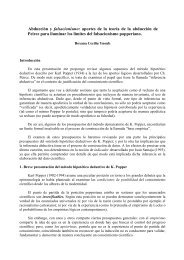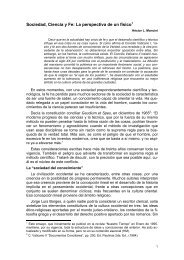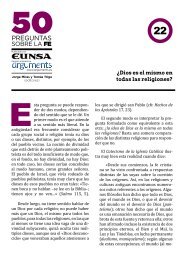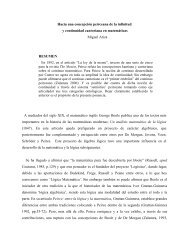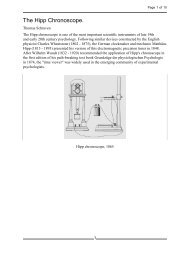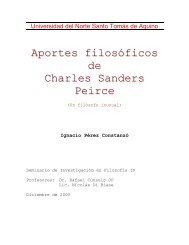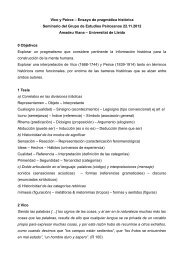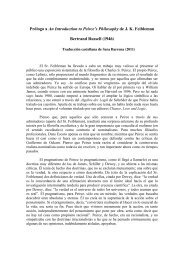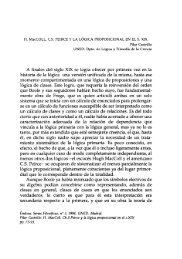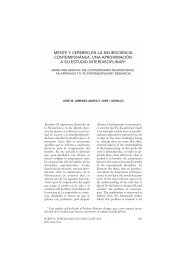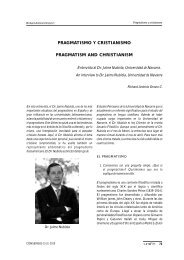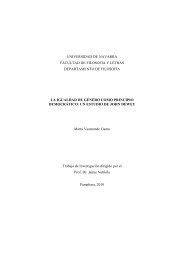Brucellosis 2003 proceedings - PHIDIAS
Brucellosis 2003 proceedings - PHIDIAS
Brucellosis 2003 proceedings - PHIDIAS
You also want an ePaper? Increase the reach of your titles
YUMPU automatically turns print PDFs into web optimized ePapers that Google loves.
Short Oral Communications<br />
Immunology, pathogenesis and host-pathogen interaction<br />
cells transfected with cDNAs encoding TLR-4, TLR-2, CD14 and MD-2, together with<br />
a reporter gene 5 x NF-kB coupled to the firefly luciferase gene. The assay of the kBtranscriptional<br />
activity elicited by LPS from E. coli, Brucella melitensis, Brucella<br />
abortus, Yersinia enterocolítica, and Ochrobactrum anthropi was addressed in this<br />
sytem. LPS from enterobacteriae such as E. coli and Yersinia enterocolítica<br />
produced a significant increase of kB-transcriptional activity on cells expressing TLR-<br />
4, CD14 and MD-2, whereas the remaining LPS failed to do so, even though the cells<br />
coexpressed TLR-2 as well. Attempts to address by ribonuclease protection assay<br />
some of the sets of genes, the expression of which could be influenced by LPS,<br />
showed a strong induction of chemokines (MIP-1a, MIP-1b, IL-8, and RANTES) by<br />
enterobacteria LPS, whereas a weaker expression was observed in response to<br />
Brucella spp and Ochrobactrum anthropi LPS. These data indicate that the different<br />
chemical structures of LPS might explain the induction of distinct proinflammatory<br />
effects through TLR or through other signalling pathway(s).<br />
PO5- Brucella abortus ACTIVATES DENDRITIC CELLS AND SPLENOCYTES TO<br />
SECRETE IL-12P40 AND TNFa VIA DIFFERENT TOLL-LIKE RECEPTORS.<br />
Li-Yun Huang, Julio Aliberti, Cynthia Leifer, and Basil Golding. CBER, FDA, and LPD NIAID,<br />
Bethesda, MD, 20892, USA.<br />
Cattle and humans are susceptible to infection with the Gram-negative<br />
intracellular bacterium Brucella abortus (BA). Heat-killed BA (HKBA) is a strong Th-1<br />
adjuvant and carrier. Previously, we have demonstrated that dendritic cells (DC)<br />
produce IL-12 in response to HKBA stimulation. In the present study, we use<br />
knockout mice and in vitro reconstitution assays to examine the contribution of<br />
signaling by Toll-like receptors (TLRs) and their immediate downstream signaling<br />
initiator, MyD88, in the activation of DCs following stimulation by HKBA. Our results<br />
show that HKBA-mediated induction of IL-12p40 and TNFa is dependent on the<br />
adapter molecule MyD88. To identify the TLR involved in HKBA recognition, we<br />
examined HKBA responses in TLR2 and TLR4 deficient animals. In serum, TNFa<br />
responses to HKBA were TLR4-independent; however, the response in TLR2<br />
deficient mice was significantly delayed and reduced, although not completely<br />
abolished. Interestingly, the IL-12p40 response to HKBA, as well as the upregulation<br />
of CD40, CD80, and CD86 in DC, is both TLR2- and TLR4-independent, suggesting<br />
that other TLR may mediate HKBA recognition in these APC. Studies using reporter<br />
cell lines confirmed the results seen with knockout mice, namely TLR2, but not TLR4,<br />
can mediate cellular activation by HKBA. In addition, HEK293 cells, which do not<br />
respond to HKBA, were made responsive by transfecting TLR2, but not TLR1, TLR4,<br />
TLR6 or TLR9. Taken together, our data demonstrate that MyD88-dependent<br />
pathways are crucial for DC activation by HKBA and that TLR2 plays a role in TNFa,<br />
but not IL-12p40 pathways activated by this microbial product. Ongoing studies are<br />
aimed at identifying the possible molecular partners for DC recognition of HKBA.<br />
68<br />
<strong>Brucellosis</strong> <strong>2003</strong> International Research Conference


